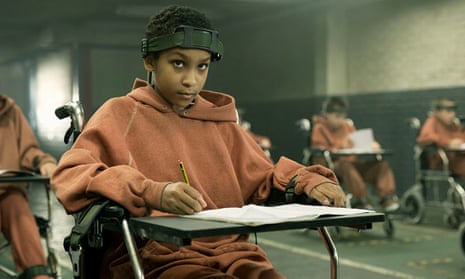This fiercely intelligent British chiller from Scottish director Colm McCarthy, whose small-screen credits include Doctor Who, Sherlock and Peaky Blinders, breathes new life into age-old horror tropes, taking familiar fears of zombies, the apocalypse and eerie children and spinning them in surprising ways. Although writer Mike “MR” Carey’s narrative about a fungal plague that turns victims into cannibalistic “hungries” occupies a post-28 Days Later landscape, the central obsessions explored here are closer to the identity crises of Never Let Me Go (both book and film), with a strong underlying strain of the very British weirdness of John Wyndham.
The budget may have been relatively constrained (£4.4m), but not so the ambition of the film-makers who conjure a gripping genre picture as fleet-footed as its nimbly marauding zombies, juggling thoughtfulness and gore, brains and brawn, with subversive wit and invention.
We open in disorienting fashion as a young girl in a prison cell settles herself into a manacled wheelchair, awaiting the arrival of armed guards. This is Melanie (arresting newcomer Sennia Nanua), one of several similarly shackled children whose confinement seems inexplicable – until one of them tries to bite the forearm of Paddy Considine’s military martinet Sergeant Eddie Parks. Infected by – yet partly resistant to – a zombiefying plague that has ravaged the world (the violent manner of their creation bizarrely recalls cult 1970s British horror To the Devil a Daughter), these strangely dangerous kids are now being held as the key to a possible cure.
But while Dr Caroline Caldwell (Glenn Close) sees them as specimens to be cultivated and cut up, psychologist/teacher Helen Justineau (Gemma Arterton) believes in their essential humanity (“they’re only children”) and delights them with tales of Greek myths. When their rural army base is besieged, this warring group embarks upon a road trip towards London, during which Melanie’s true nature will be doubted, fought over and gradually revealed.
Former 2000AD writer Carey’s script departs astutely from his 2014 novel of the same name, most notably in stripping out the “junkers” (gangs of rebel humans) in order to streamline the narrative. Instead, we focus ever more closely on the interpersonal dynamics within the central group as they make their suspicious way through a landscape overgrown by triffid-like vegetation, the mycelium stage of the fungus’s evolution. There’s a Cronenbergian edge to the film’s ambivalent attitude towards infection, encapsulated in Nanua’s nuanced performance that shifts between youthful innocence, feral survivalism and opiate-like addiction. Scenes of Melanie in a Hannibal Lecter-style mask strapped to the roof of a military vehicle combine horror and pathos with absurdist aplomb. Elsewhere, encounters with others of her kind recall both the tribalism of Lord of the Flies and the alien bonds of Wyndham’s The Midwich Cuckoos, the latter of which seems to have been something of a tonal touchstone.
A startling vision of London’s BT Tower overgrown by colossal foliage is just one of several production design coups that evoke a world Ray Bradbury might have recognised. But while McCarthy isn’t afraid to nod towards cinematic predecessors such as George A Romero (images of hungries loitering in the doorways of Waterstones and Waitrose knowingly recall his Dawn of the Dead), his vision remains singular and distinctive, moving the genre forward rather than merely retreating into its past. In this endeavour he is assisted by a superb score by Cristobal Tapia de Veer, best known for his work on TV’s Utopia and, more recently, National Treasure. Using treated human voices to create theremin-like wails and unearthly rumbles, the Chilean-born composer has conjured a shimmering soundscape that is every bit as integral to the film’s uncanny power as Mica Levi’s groundbreaking work on Under the Skin.
The performances are strong too, with Arterton rising to the challenge of her best role since The Disappearance of Alice Creed, Glenn Close underwriting steely determination with something more fragile, and Paddy Considine convincing effortlessly as the no-nonsense soldier engaged in a losing battle. As for Nanua, a bright future clearly awaits this rising star, who more than holds her own amid such a seasoned cast, ensuring that we sympathise with Melanie’s Pandora-esque plight even as her presence brings chaos and confusion.
A quantum leap from McCarthy’s flawed but intriguing 2010 debut feature Outcast (with which this shares some thematic concerns), The Girl With All the Gifts is exactly the kind of genre picture the UK should be making: provocative, imaginative and unafraid to sink its teeth into complex and challenging material. Bravo!

Comments (…)
Sign in or create your Guardian account to join the discussion